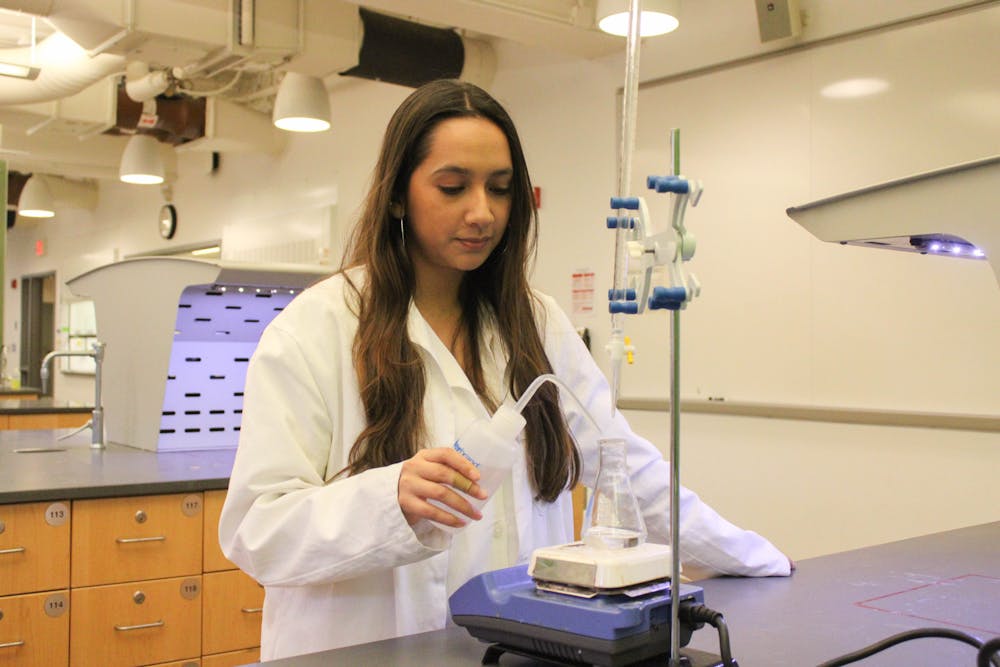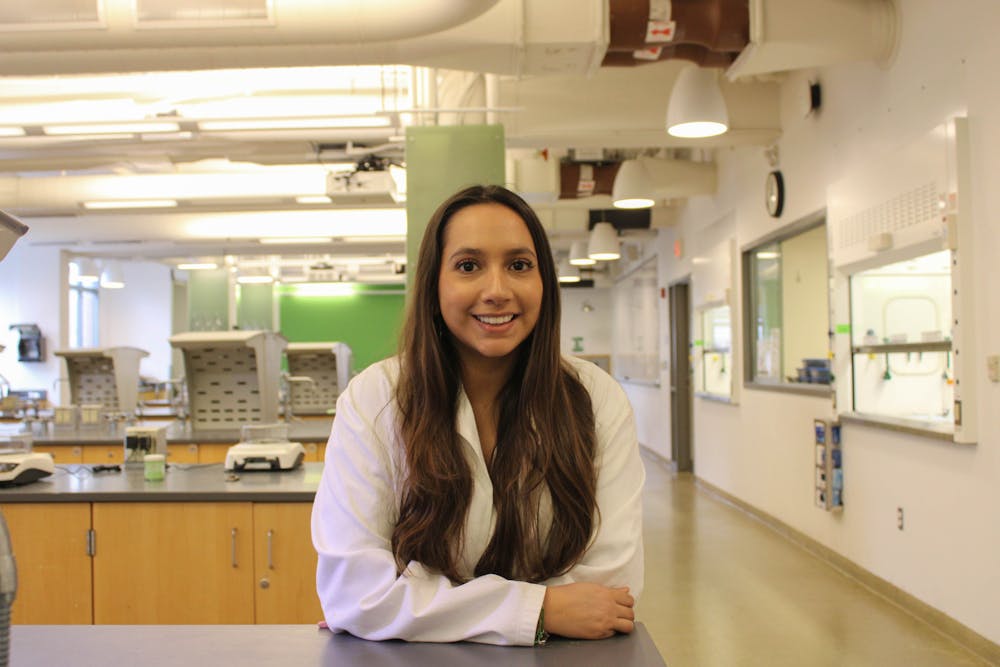Katelyn Candido (C’24) didn’t leave her role of supportive older sister at home. At Penn, she strives to be a helping hand to fellow first–generation and underrepresented students dreaming of careers in medicine. As the proud daughter of a Mexican immigrant, Katelyn channels her upbringing into her classes, friendships, and professional goals. Embodying her grandmother’s selflessness and her mother’s work ethic, Katelyn hopes to overcome the stereotype of "cutthroat" surgeon by bringing humanity and humility into the ER.
Name: Katelyn Candido
Hometown: Dallas, Texas
Majors: Neuroscience, Medical Anthropology, and Psychology
Minors: Medical Sociology, Bioethics, and Philosophy
Activities: Research at HUP Trauma Surgery Department, Whole Health Equity Lab, Johnson Scholars House Leader, PENNSCAPE and PENNRSSA Medicine Pathway Direct, Puentes de Salud Student Chair

What first sparked your interest in medicine?
It first started when I read Gifted Hands by Ben Carson in middle school. I come from a Hispanic family; my mom is an immigrant from Mexico, so the book resonated with me. I also think that brains are cool! I actually worked in a research lab my junior year of high school to do research on genes associated with autism. However, I found that I’m not that into research and crave more of a social interaction in my future career, so practicing medicine was the perfect choice.
My grandma also ended up getting cancer, so I had many interactions with physicians in hospitals. This is where my interest in anthropology stemmed from, as I started noticing disparities in healthcare and thinking of ways to fix them to make it more equitable.
Do you think that being an older sister at home shaped your character in wanting to be a something like a 'sister' to other students at Penn?
Yeah, 100%. I have a little brother, Steven, and a little sister, Brianna. Because there is quite a significant age gap between us (7 to 8 years), I was always, kind of, their second mom. I’d joke a lot that, I’m their mom and they are my kids. This made me want to start being a TA, which I first tried when I was a sophomore. I have since been a TA in chemistry and psychology. I do a lot of mentorship, in general, and get to see my kids as they progress and grow. When I’m mentoring, I want to see them actually succeed and go to medical school.
I’ll help you! I'll write you a recommendation!
Who is a role model that you look up to?
Probably my mom and my grandma. I look up to the work ethic and discipline that my mom taught me, but also balancing it with remaining humble and knowing your roots and not letting that slip away. I want to overcome the stereotype that a surgeon has to be cruel and cutthroat; I want to take what they both taught me and still be driven, but also be humane. I want to be able to help and care about people.
What was it like working for the non-profit clinic Puentes de Salud?
I’m still planning on being there for a while after graduating from Penn. I’m going to be attending the Perelman School of Medicine to pursue neurosurgery, and I hope to work there during my time in medical school. The clinic serves undocumented immigrants, meaning they don’t have any health insurance, and it is often the only place where they can seek medical attention. At the start, I mostly did administration work and took patient vitals, but next year I am planning on being a sub–intern and doing more practical work. In addition to being a volunteer in the clinic, I am also a student chair, which means I can help plan events, organize mammogram clinics, and work on patient outreach for undocumented immigrants.
Do you remember any memorable moments from your time at the clinic that stuck with you?
Yes, definitely! One patient in particular, who came in often and had visited about three weeks ago, had returned. Previously, Dr. Larson, who is a top and very skilled doctor, had sent him home and thought he was getting better. However, when he returned, his blood pressure was in the 40s (which is extremely low), and he was weighing at about only 90 pounds. We were not sure what was wrong with him. He said in the last few weeks he had felt nauseous and had passed out multiple times. So one of the clinic’s doctors ordered an Uber for the patient and told a medical student to accompany him and make sure they treat him correctly in the emergency department of a bigger hospital. That moment stuck with me as the kind of doctor I want to be, remembering my "why."
You also worked in the trauma surgery department at HUP. What was that like?
That was also really fun. I was blessed to be paired with really great mentors, such as Dr. Kaufman. Dr. Kaufman was the first one who let me enter into an OR (operating room) and shadow her while she performed a surgery. She even told me to put on gloves and feel a gallbladder that she had removed! That was my first time getting to do that.
During my time in the department, I was mostly involved in a research study, and it was my job to follow up with trauma patients. I followed up with them in periods of six months, 12 months, and 18 months to examine the long–term impacts that trauma could have had on them. I was examining trends, such as whether males experience less pain, whether their pain is treated more, and whether there are certain lower body injuries that have a more severe long–term impact.
What do you see yourself doing in five and ten years?
In five years, after finishing medical school, I will barely be starting residency, hopefully in neurosurgery. Throughout college, I have tried many different specialties and areas, but I have loved neurosurgery most. Seeing that brain right there, on the operating table—there's simply nothing like it! After finishing residency, which lasts seven years, I’m thinking of going into pediatric surgery.
Lightning Round:
Favorite spot on campus: Third and fourth floor of Levine, the neuroscience building.
Favorite thing to do in Philly: Running by the river on the Schuylkill Trail.
Favorite classes at Penn: Intro to Positive Psychology and Intro to Medical Anthropology
Soundtrack to your life: "I Lived" by OneRepublic
Hot take: I'm not a fan of coffee. I do drink a lot of tea though!
Favorite book: Lessons in Chemistry by Bonnie Garmus
There are two kinds of people at Penn...Those who can’t put a book down and those who can never pick one up.
And you are? I can never put a book down!
This interview has been edited and condensed for clarity.
Do you know that one senior who brings a smile to everyone's face or always has the craaaaziest stories? It's time to give them the recognition they deserve. Ego of the Week seeks to showcase seniors, not for their grades or other fake academic construct, but for who they are as a person and the joy they bring to the people around them! Nominate your favorite Penn Seniors for Ego of the Week!

